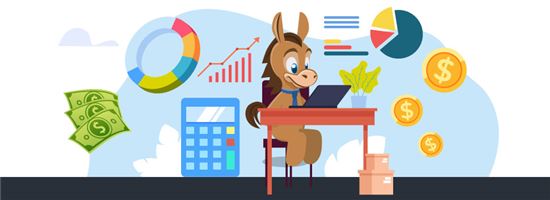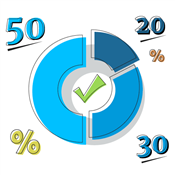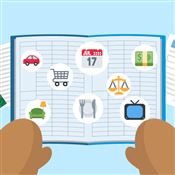Budgeting Statistics: By the Numbers
Budgeting is not easy. Many times it can have your head hurting before you even start. Find out how others deal with it.
 |
Many people have trouble keeping track of their money.
It's so easy to let go of. And yet so hard to know exactly where it's gone. When you budget, you can stem those impulse purchases. Whether made from your laptop, iPad, or credit card.
But who's actually budgeting and to what extent? Here are the latest statistics on the topic.
Keep Track, Save Money
The fact is not many people do it. Only 32% of U.S. households prepare a monthly budget.
Whether you budget may depend on your education:
- 38% of college-educated folks practice the budgeting habit.
- Only 26% of those with a high school education or less do it.
Out of people who budget, 70% take the time to check their spending against it once a week.
How Is the Money Spent
So, how does the content of our budgets look? According to BLS, in 2020, an average household spent a total of $61,334 per year.
- $21,409 or about 35% of the total is spent on housing
- $9,826 went to transportation
- $7,316 was for food, including $2,375 spent on eating out
The next largest categories were:
- Personal insurance and pensions at $7,246
- Health care at $5,177
- Entertainment at $2,912
- $2,283 donated to churches, charities, and other causes
The content of Americans' budgets has changed tremendously over the years. The BLS reports back in 1901 the average family's expenditures added up to just $769 per year:
- 42.5% went to food
- 23.3% to housing
That means more than two-thirds of spending was on these basic necessities. Compared with less than 50% today.
Rainy Day Funds
A major reason people keep a budget is to set aside money for the future. According to the Bureau of Economic Analysis, Americans saved an average of 6.4% of their incomes as of 2022.
Americans' personal savings rates were typically above 10% between 1960 and the mid-80s. But they've plummeted since then.
Interestingly, during boom years, people tend to have the lowest savings rates. In July of 2005, the rate was only 2%.
A CreditDonkey survey found that 29.2% of respondents aren't saving any of their income. But 10.8% are saving more than 20% of their income.
How to Save for Rainy Days
Many people find a good way to save money is to have specific goals in mind.
Building up a reserve equal to six months of income can help guard against financial disaster. Saving for a house, putting money in the kids' college accounts, and preparing for retirement can provide motivation for saving.
Accounts with high annual percentage rates, such as a high-yield savings account, can help those savings grow. Meanwhile keeping them separate from regular everyday spending accounts.
How to Do the Numbers
So, how do you make sure you're saving as much as you want?
Among households that keep a budget:
- 70.7% use a bank account website
- 31.7% plug their numbers into a spreadsheet
- 20.8% use a checkbook
- 29.2% use either a mobile app or computer software
The Gallup survey found that 30% of respondents make long-term financial plans. Using it to save or invest their extra cash.
- For people with a high school degree or less, the number is 20%.
- College grads tend to stand at 38%.
- Among households with incomes of $75,000 or more, 43% have investment and savings plans.
- Only 18% of those pulling in less than $30,000 have such funds.
One of the easiest ways to start saving is to open a savings account for your extra funds.
Of homes that plan for savings and investment, 24% use an accountant or certified financial planner. While 32% use a computer program, such as Empower.
Many websites automatically break down customers' purchases by category. And, with mobile apps, it's an even easier matter to track every purchase. Including those made with cash.
In some ways, modern technology can make us more likely to go over budget by falling for that enticing, impulsive buy. But, at the same time, it also provides a way to focus on long-term plans and keep those impulses under control.
Bottom Line
Budgeting might seem like a tedious task. But in the long run, it pays off.
Holding off on an impulse purchase is not a punishment. Quite the contrary. It is something you will be thankful for during a rainy day. And it can help you avoid buying something you won't use.
Always make a plan and follow through. You will find it much easier to have your expenses logged in. You can use a budget calculator for this. That way, you know where your money is going, and where it should go.
Livia Gershon is a contributing writer at CreditDonkey, a personal finance comparison and reviews website. Write to Livia Gershon at livia@creditdonkey.com. Follow us on Twitter and Facebook for our latest posts.
Note: This website is made possible through financial relationships with some of the products and services mentioned on this site. We may receive compensation if you shop through links in our content. You do not have to use our links, but you help support CreditDonkey if you do.
Empower Personal Wealth, LLC (“EPW”) compensates CREDITDONKEY INC for new leads. CREDITDONKEY INC is not an investment client of Personal Capital Advisors Corporation or Empower Advisory Group, LLC.
|
|
| ||||||
|
|
|







